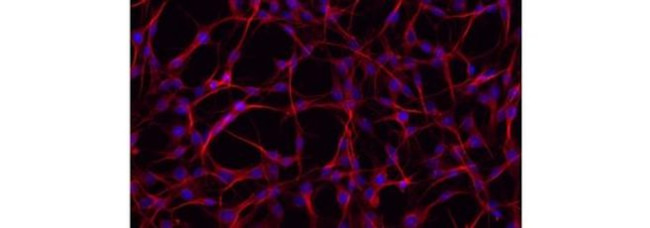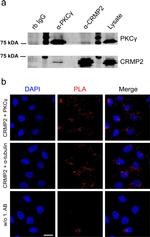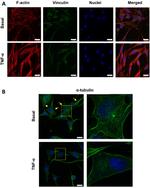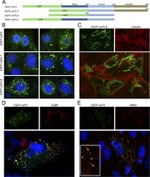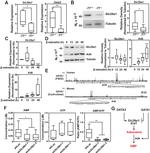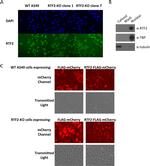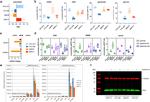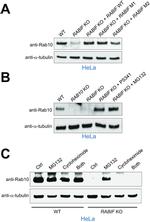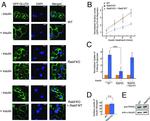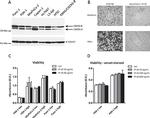Search Thermo Fisher Scientific
Invitrogen
alpha Tubulin Monoclonal Antibody (DM1A), eFluor™ 615, eBioscience™
Product Details
42-4502-82
Species Reactivity
Published species
Host/Isotype
Recommended Isotype Control
Class
Type
Clone
Conjugate
Excitation/Emission Max
Form
Concentration
Purification
Storage buffer
Contains
Storage conditions
Shipping conditions
RRID
Product Specific Information
Description: The monoclonal antibody DM1a recognizes the 50kDa cytoskeletal protein alpha tubulin in a variety of species (human, mouse, rat, monkey, dog, pig, bovine, goat, hamster, guinea pig, kangaroo, amphibians, sea urchin, yeast and tobacco plants). Tubulin, the major component of microtubules, is a dimeric protein consisting of an alpha and beta subunit. Tubulin is a GTP-binding protein that can be modified by phosphorylation and acetylation resulting in assembly (polymerization) or disassembly (depolymerization). The dynamic nature of microtubules is most evident in the mitotic apparatus. The DM1a antibody recognizes the C-terminal end of the alpha tubulin isoform (amino acids 426-430).
Applications Reported: This DM1A antibody has been reported for use in immunohistochemical staining of frozen (IHC-F) and formalin-fixed paraffin embedded (FFPE, IHC-P) tissue sections as well as immunocytochemical staining.
Applications Tested: This DM1A antibody has been tested by immunocytochemistry on fixed and permeabilized C6 cells at less than or equal to 1 µg/mL. It is recommended that this antibody be carefully titrated for optimal performance in the assay of interest. This product has not been validated for flow cytometric analysis.
Filter Recommendation: When using this eFluor® 615 antibody conjugate, we recommend a filter that will capture the 615 emission wavelength (for example, Excitation 560/55, 585LP, Emission 645/75). A standard Alexa Fluor® 594 filter is acceptable.
Excitation: 595 nm; Emission: 615 nm.
Filtration: 0.2 µm post-manufacturing filtered.
Target Information
Alpha Tubulin is a part of a heterodimer consisting of alpha and beta tubulin subunits. The alpha and beta tubulins, which are each about 55 kDa MW, are homologous but not identical. Alpha-beta tubulin heterodimer is the basic building block of microtubules, and this intracellular cylindrical filamentous structure is present in almost eukaryotic cells. Microtubules serve as structural supports and lines of transport within the cell, as well as serving a key role in mitosis. Microtubules of the eukaryotic cytoskeleton perform essential and diverse functions and are composed of a heterodimer of alpha and beta tubulins. The alpha and beta tubulins represent the major components of microtubules, while gamma tubulin plays a critical role in the nucleation of microtubule assembly. There are multiple alpha and beta tubulin genes, which are highly conserved among species. The gene that encodes alpha tubulin is highly similar to the mouse and rat Tuba1 gene. Northern blotting studies have shown that the gene expression is predominantly found in morphologically differentiated neurologic cells.
For Research Use Only. Not for use in diagnostic procedures. Not for resale without express authorization.
Bioinformatics
Protein Aliases: alpha tubulin; alpha-tubulin; Alpha-tubulin 1; Alpha-tubulin 2; Alpha-tubulin 3; Alpha-tubulin 3C; alpha-tubulin 3C/D; Alpha-tubulin 3E; Alpha-tubulin 4; Alpha-tubulin 6; Alpha-tubulin isotype M-alpha-1; Alpha-tubulin isotype M-alpha-2; Alpha-tubulin isotype M-alpha-4; Alpha-tubulin isotype M-alpha-6; Alpha-tubulin ubiquitous; beta-tubulin T beta15 (aa 1-445); class II beta-tubulin isotype; class IIb beta-tubulin; FLJ30169; H2 ALPHA; hum-a-tub1; hum-a-tub2; T beta-15; Talpha1 alpha-tubulin; Testis-specific alpha-tubulin; TUBA1/3/4; Tubulin alpha; tubulin alpha 3; Tubulin alpha chain-like 3; Tubulin alpha-1 chain; Tubulin alpha-1A chain; Tubulin alpha-1B chain; Tubulin alpha-1C chain; Tubulin alpha-2 chain; Tubulin alpha-3 chain; Tubulin alpha-3C chain; Tubulin alpha-3E chain; Tubulin alpha-4 chain; Tubulin alpha-4A chain; Tubulin alpha-6 chain; Tubulin alpha-ubiquitous chain; Tubulin B-alpha-1; Tubulin beta-2B chain; Tubulin H2-alpha; Tubulin K-alpha-1; tubulin, alpha 1; tubulin, alpha 1 (testis specific); tubulin, alpha 1a; tubulin, alpha 1b; tubulin, alpha 1c; tubulin, alpha 2; tubulin, alpha 3c; tubulin, alpha 3e; tubulin, alpha 4; tubulin, alpha 4a; tubulin, alpha 6; tubulin, alpha, brain-specific; tubulin, alpha, ubiquitous; tubulin, alpha-like 3; tubulin, beta 2; tubulin, beta 2B class IIb; tubulin, beta polypeptide paralog
Gene Aliases: 2410129E14Rik; ALS22; B-ALPHA-1; bA408E5.3; bA506K6.1; bcm948; brdp; H2-ALPHA; K-ALPHA-1; LIS3; M[a]4; M[a]6; PMGYSA; RGD1309427; RGD1565476; Tuba-1; TUBA1; TUBA1A; TUBA1B; TUBA1C; TUBA2; TUBA3; TUBA3C; TUBA3E; Tuba4; TUBA4A; TUBA6; TUBAL3; Tubb2; Tubb2a; TUBB2B
UniProt ID: (Human) Q71U36, (Pig) Q2XVP4, (Human) P68363, (Human) Q9BQE3, (Human) P0DPH7, (Human) Q6PEY2, (Human) P68366, (Human) A6NHL2, (Human) Q9BVA1, (Mouse) Q5XJF8, (Rat) P68370, (Mouse) P05213, (Rat) Q6P9V9, (Mouse) P05216, (Rat) Q6AYZ1, (Mouse) P68368, (Rat) Q5XIF6, (Mouse) Q3UX10, (Mouse) Q9CWF2, (Rat) Q3KRE8
Entrez Gene ID: (Dog) 106557476, (Pig) 100135051, (Human) 7846, (Pig) 733594, (Human) 10376, (Human) 84790, (Human) 7278, (Human) 112714, (Pig) 100151951, (Dog) 478918, (Human) 7277, (Human) 79861, (Dog) 487148, (Pig) 100623355, (Dog) 478702, (Human) 347733, (Pig) 100153507, (Mouse) 22142, (Rat) 64158, (Mouse) 22143, (Rat) 500929, (Mouse) 22146, (Rat) 300218, (Mouse) 22145, (Rat) 316531, (Rat) 291287, (Mouse) 238463, (Mouse) 73710, (Rat) 291081

Performance Guarantee
If an Invitrogen™ antibody doesn't perform as described on our website or datasheet,we'll replace the product at no cost to you, or provide you with a credit for a future purchase.*
Learn more
We're here to help
Get expert recommendations for common problems or connect directly with an on staff expert for technical assistance related to applications, equipment and general product use.
Contact tech support
